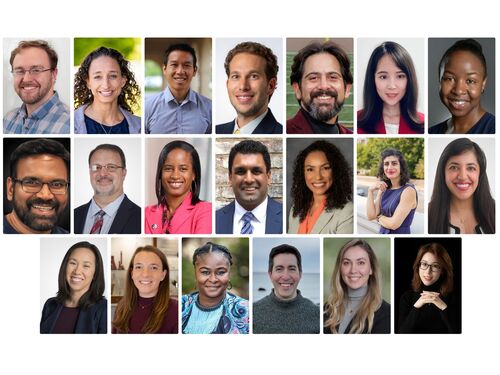New Report Recommends Broad Policy Improvements to Reduce Opportunity Gaps for Young Children
News Release
By Hannah Fuller
Last update May 16, 2023
TUNE IN: Members of the committee that wrote the report will discuss its findings and recommendations during a webinar starting at 1 p.m. ET today.
WASHINGTON — A new report from the National Academies of Sciences, Engineering, and Medicine recommends federal, state, and community level policy changes to reduce opportunity gaps and resulting achievement gaps for young children across the U.S. The report calls for the establishment of early childhood education as a right for all children, equitable access to services for children with disabilities, increased federal interagency collaboration on children’s mental health care, and addressing barriers that families face in accessing resources.
Varying access to services and support result in opportunity gaps — the inequitable distribution of resources and experience based on demographic factors, such as race and ethnicity, income, social class, gender, national origin, language background, and disability. Opportunity gaps in early childhood may lead to long-term disparities in outcomes for children in education, physical health, and social and emotional development that have detrimental effects on individuals, communities, and broader society.
From school quality to health care access to neighborhood resources, state and federal policies and administrative barriers disproportionately affect availability of resources and services for communities of color, immigrant families, and families with low income. In addition to other life circumstances, the report highlights the role that structural racism and discrimination play in perpetuating the opportunity gap for children. While many of these structural inequities have their origins in the past, the compounded effects persist and continue to affect the well-being of children and families.
“Policies at all levels have real-life consequences, and we see that most in our youngest and most vulnerable populations,” said LaRue Allen, chair of the committee that wrote the report and professor and vice dean at the Steinhardt School of Culture, Education, and Human Development at New York University. “We have substantial evidence that certain policies, such as establishing early childhood education as a right and fully integrating the Individuals with Disabilities Education Improvement Act, will improve opportunity and outcomes for kids. Our report calls for improvements across systems that serve young children and their families, so that all children can live the vibrant future they deserve.”
The report explores the extensive evidence on opportunity gaps among young children and provides the following policy recommendations:
Establish early childhood education for all. The federal government and states should establish early learning opportunities as a right afforded to all children and families who need and want services. This access to early learning should be accompanied by legal accountability guaranteeing inclusive and intentional quality standards. In addition, the federal government should fully implement a voluntary universal high-quality public early care and education system.
Increase equitable access to quality elementary education. The federal government, states, local communities, and districts should adequately and equitably support elementary school education and out-of-school programs. Elementary school education should operate under a common quality framework, with quality benchmarks aligned to those in the early care and education system and based on evidence-based policies and practices.
Improve programing for students with disabilities. The U.S. Department of Education should fully integrate the Individuals with Disabilities Education Improvement Act’s programming with general early childhood and K-12 education. As part of achieving this goal, the agency, states, and districts should engage in specific reforms that explicitly address opportunity gaps — such as uneven access to special education, and exclusion of children with disabilities across age groups from school activities.
Improve and enforce policies that affect working families. Research shows that income from full-time employment does not cover the basic needs for many working families. The report highlights how opportunity gaps for children grow when their parents’ employers do not provide benefits such as paid leave or child care. The U.S. Department of Labor and U.S. Department of Health and Human Services should review policies that disproportionately affect working families with young children, and enforce improved labor policies.
Support policies to reduce racial inequities and racism. Intersections of demographic factors with social determinants of health — the conditions where people are born and live that affect a wide range of health and life outcomes — can result in systems that create disadvantages and multiply negative effects. This leads to compounding opportunity gaps across a child’s life, becoming the cause of future opportunity gaps, says the report. The federal government should support policies and interventions to target social determinants of health that perpetuate opportunity gaps at the community level. In addition, education systems, health care systems, and employers should identify and address where institutional racism manifests and reduces access to quality services in education, health care, and public health.
Foster collaboration for children’s mental health. HHS should create and lead the coordination of an interagency group focused on children’s mental health, for the purpose of designing a comprehensive system of primary mental health care for young children and their families. This group could include the several HHS operating divisions, as well as the departments of Education, Justice, and Housing and Urban Development.
Collect and share equity-focused data for use in policy. The report calls for the creation of a robust data collection and sharing infrastructure related to child health and development. Federal entities and agencies and private philanthropic organizations that collect data and fund research should create and adequately support collection of both quantitative and qualitative data, data analysis, and program evaluation that guides policy decisions to close the opportunity gap. This data infrastructure should also be made available for research and learning to further identify ways to reduce opportunity gaps for children.
The report was undertaken by the Committee on Exploring the Opportunity Gap for Young Children From Birth to Age Eight and sponsored by the Administration for Children and Families, Bainum Family Foundation, Bill & Melinda Gates Foundation, Brady Education Foundation, Foundation for Child Development, Heising-Simons Foundation, and the W.K. Kellogg Foundation.
The National Academies of Sciences, Engineering, and Medicine are private, nonprofit institutions that provide independent, objective analysis and advice to the nation to solve complex problems and inform public policy decisions related to science, engineering, and medicine. They operate under an 1863 congressional charter to the National Academy of Sciences, signed by President Lincoln.
Contact:
Hannah Fuller, Media Relations Officer
Office of News and Public Information
202-334-2138; e-mail news@nas.edu
Featured Publication
Closing the Opportunity Gap for Young Children
Consensus Study Report
·2023
Many young children in the United States are thriving and have access to the conditions and resources they need to grow up healthy. However, a substantial number of young children face more challenging conditions such as: poverty; food insecurity; exposure to violence; and inadequate access to healt...
View details
More like this
Discover
Events
Right Now & Next Up
Stay in the loop with can’t-miss sessions, live events, and activities happening over the next two days.
NAS Building Guided Tours Available!
Participate in a one-hour guided tour of the historic National Academy of Sciences building, highlighting its distinctive architecture, renowned artwork, and the intersection of art, science, and culture.



